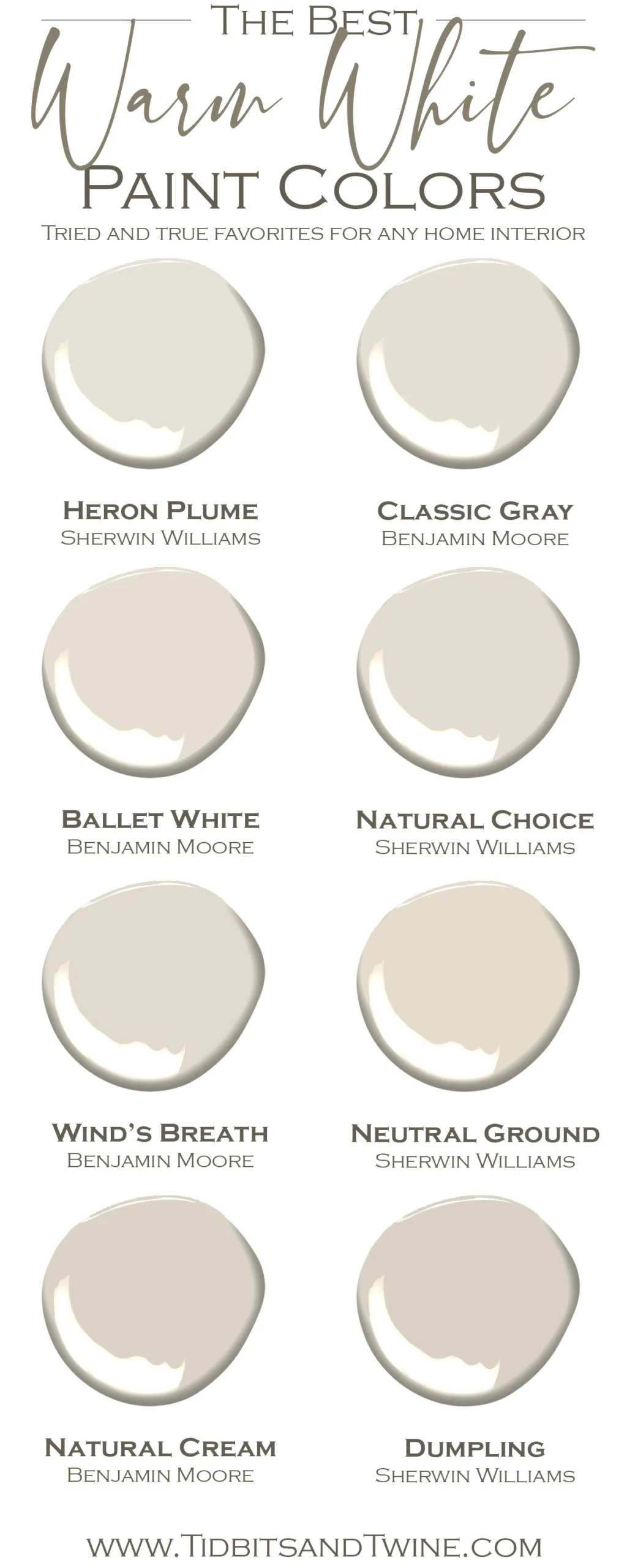Cozy Up Your Home: Sherwin Williams Warm White Paint Guide

Choosing the right white paint can be surprisingly challenging. Pure white can feel sterile, while some off-whites can appear dingy or yellow. That's where the magic of Sherwin Williams warm white paints comes in. These aren't just any whites; they're carefully crafted hues with subtle undertones that create a cozy, inviting atmosphere.
Warm whites are the unsung heroes of interior design, adding depth and character without overwhelming a space. They offer a versatile backdrop for any decor style, from minimalist to traditional. This comprehensive guide will delve into the world of Sherwin Williams warm whites, helping you navigate the numerous options and find the perfect shade for your home.
Sherwin Williams offers a wide range of warm white paints, each with its unique personality. Understanding the nuances of these colors is key to making the right choice. Some lean towards creamy undertones, while others have hints of beige or gray. This guide will break down the most popular choices and provide practical tips for selecting the best one for your needs.
The history of warm white paints is intertwined with the evolution of interior design. As tastes shifted away from stark, cool whites, the demand for warmer, more inviting hues grew. Sherwin Williams, a leader in the paint industry, has been instrumental in developing and popularizing these sophisticated shades. Their extensive palette reflects the diverse needs and preferences of homeowners.
Warm white paints play a crucial role in creating a welcoming and comfortable home environment. They offer a versatile foundation that enhances natural light and complements a wide range of furnishings and decor styles. However, choosing the wrong warm white can lead to unexpected results. A shade that looks perfect in one room might appear too yellow or too gray in another, depending on the lighting and surrounding colors.
Alabaster, Creamy, and Navajo White are popular Sherwin Williams warm white options. Alabaster is a versatile choice known for its soft, creamy undertone. Creamy, as the name suggests, offers a richer, more saturated warmth. Navajo White leans towards a beige undertone, creating a cozy, earthy feel. These are just a few examples, and exploring the Sherwin Williams website or visiting a local store can provide a more comprehensive view of their warm white offerings.
One benefit of Sherwin Williams warm whites is their versatility. They work well in various rooms, from living rooms and bedrooms to kitchens and bathrooms. For example, Alabaster can brighten a north-facing room, while Creamy adds warmth to a larger, open space. Another benefit is their ability to complement different decor styles. A warm white backdrop can enhance the vibrancy of colorful accents or create a serene atmosphere with neutral furnishings. Finally, these paints create a timeless appeal, avoiding trends that quickly become dated.
When choosing a Sherwin Williams warm white, consider the room's lighting, size, and existing decor. Test paint samples on your walls to see how the color interacts with the light throughout the day. Also, consider the undertones of your flooring, furniture, and other fixed elements.
Advantages and Disadvantages of Sherwin Williams Warm Whites
| Advantages | Disadvantages |
|---|---|
| Creates a warm and inviting atmosphere | Can be challenging to choose the right shade |
| Versatile and complements various decor styles | May appear differently under various lighting conditions |
| Enhances natural light | Requires careful consideration of existing decor and undertones |
Five best practices for implementing Sherwin Williams warm whites include testing paint samples, considering the room's lighting, coordinating with existing decor, using primer for optimal coverage, and applying multiple coats for a consistent finish.
Real examples of Sherwin Williams warm whites used in various settings can be found on the company's website and numerous interior design blogs. Look for examples showcasing Alabaster, Creamy, and Navajo White in different rooms and decor styles.
A challenge when using warm whites is selecting the right undertone. A solution is to test samples and compare them under different lighting conditions. Another challenge is ensuring consistent coverage. The solution is to use a high-quality primer before painting.
FAQs: What is the difference between warm white and cool white? Which Sherwin Williams warm white is best for a small room? What undertones are present in Alabaster? How do I choose between Creamy and Navajo White? What primer should I use with Sherwin Williams warm whites? How many coats of paint are recommended? Where can I find inspiration for using warm whites in my home? How do I clean walls painted with Sherwin Williams warm whites?
A tip for using Sherwin Williams warm whites is to layer different shades to create depth and interest. For instance, use a slightly darker warm white on the trim and a lighter shade on the walls.
In conclusion, Sherwin Williams warm white paints offer a versatile and sophisticated way to enhance your home's ambiance. From creating a cozy living room to brightening a small bathroom, these carefully crafted hues add depth and character without overwhelming a space. By understanding the nuances of different warm whites and following the tips and best practices outlined in this guide, you can confidently choose the perfect shade to transform your home into a warm and inviting sanctuary. Take the time to explore the various options, test samples, and consider your existing decor. The right warm white can make all the difference in creating a space you'll love for years to come. Don't be afraid to experiment and find the perfect warm white that reflects your personal style and enhances the beauty of your home. Start your journey to a warmer, more inviting home today by exploring the world of Sherwin Williams warm whites.
Mineral gray sherwin williams exterior the only guide you need
Unlocking victory ea sports fc 24 pro clubs strategies
Decoding medicare part d supplement insurance













